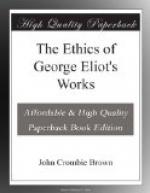Thenceforth the Cross, as the typical representation of this truth, became a recognised power on the earth. Thenceforth every great teacher of humanity within the pale of nominal Christendom, whatever his apparent tenets or formal creed, has been, in degree as he was great and true, explicitly or implicitly the expounder of this truth; every great and worthy life, in degree as it assimilated to that ideal life, has been the practical embodiment of it. “Endure hardness,” said one of its greatest apostles and martyrs, “as good soldiers of Christ.” And to the endurance of hardness; to the recognition of something in humanity to which what we ordinarily call life and all its joys are of no account; to the abnegation of mere happiness as aim or end,—to this the world of Christendom thenceforth became pledged, if it would not deny its Head and trample on His cross.
In no age has the truth been a popular one: when it becomes so, the triumph of the Cross—and in it the practical redemption of humanity—will be near at hand. Yet in no age—not the darkest and most corrupt Christendom has yet seen—have God and His Christ been without their witnesses to the higher truth,—witnesses, if not by speech and doctrine, yet by life and death. Even monasticism, harshly as we may now judge it, arose, in part at least, through the desire to “endure hardness;” only it turned aside from the hardness appointed in the world without, to choose, and ere long to make, a hardness of its own; and then, self-seeking, and therefore anti-Christian, it fell. Amid all its actual corruption the Church stands forth a living witness, by its ritual and its sacraments, to this fundamental truth of the Cross; and ever and anon from its deepest degradation there emerges clear and sharp some figure bending under this noblest burden of our doom—some Savonarola or St Francis charged with the one thought of truth and right, of the highest truth and right, to be followed, if need were, through the darkness of death and of hell.
Perhaps few ages have needed more than our own to have this fundamental principle of Christian ethics—this doctrine of the Cross—sharply and strongly proclaimed to it. Our vast advances in physical science tend, in the first instance at least, to withdraw regard from the higher requirements of life. Even the progress of commerce and navigation, at once multiplying the means and extending the sphere of physical and aesthetic enjoyment, aids to intensify the appetite for these. Systems of so-called philosophy start undoubtingly with the axiom that happiness is the one aim of man: and with at least some of these happiness is simply coincident with physical well-being. Political Economy aims as undoubtingly to act on the principle, “the greatest possible happiness of the greatest possible number:” and perhaps, as Political Economy claims to deal with man in his physical life only, it were unreasonable to expect from it regard to aught above this.




